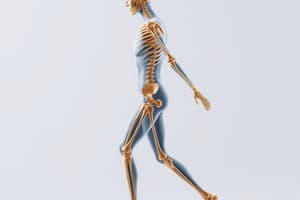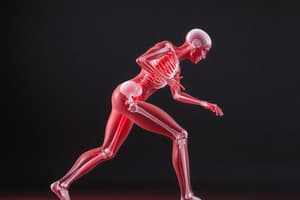Podcast
Questions and Answers
What does the branch of study mentioned investigate?
What does the branch of study mentioned investigate?
- The types of forces acting on a body
- The effects of motion on bodies
- The changes in temperature of bodies
- The stillness of bodies under the influence of forces (correct)
What is the state of a body described as when balanced forces act on it?
What is the state of a body described as when balanced forces act on it?
- In a state of equilibrium (correct)
- In a state of acceleration
- In a state of motion
- In a state of instability
Which of the following best describes balanced forces?
Which of the following best describes balanced forces?
- Forces resulting in an unequal distribution of motion
- Forces that cause an object to speed up
- Forces that keep a body at rest or in constant motion (correct)
- Forces that only apply to living organisms
Which condition indicates that forces acting on a body are unbalanced?
Which condition indicates that forces acting on a body are unbalanced?
What happens to a body when it is under the influence of balanced forces?
What happens to a body when it is under the influence of balanced forces?
What is a primary benefit of understanding body movements?
What is a primary benefit of understanding body movements?
How does understanding limb movement affect an individual?
How does understanding limb movement affect an individual?
Which of the following outcomes is NOT associated with understanding body movements?
Which of the following outcomes is NOT associated with understanding body movements?
Why is it important to understand the movements one performs?
Why is it important to understand the movements one performs?
What aspect of physical activities is directly improved by understanding bodily movements?
What aspect of physical activities is directly improved by understanding bodily movements?
Which statement best summarizes the importance of movement understanding?
Which statement best summarizes the importance of movement understanding?
Which method should you avoid when dealing with calluses, corns, or warts?
Which method should you avoid when dealing with calluses, corns, or warts?
What is the recommended method for trimming toenails?
What is the recommended method for trimming toenails?
Which of the following should be avoided to prevent skin cuts?
Which of the following should be avoided to prevent skin cuts?
What is a safe practice for nail care?
What is a safe practice for nail care?
Why is it advised not to use scissors for removing calluses?
Why is it advised not to use scissors for removing calluses?
What is a consequence of using improper tools to remove warts?
What is a consequence of using improper tools to remove warts?
What should you do to maintain healthy toenails?
What should you do to maintain healthy toenails?
What role does biomechanics play in physical education?
What role does biomechanics play in physical education?
Which of the following is NOT a benefit of understanding biomechanics in movement?
Which of the following is NOT a benefit of understanding biomechanics in movement?
How does biomechanics contribute to training for athletes?
How does biomechanics contribute to training for athletes?
What is a primary purpose of biomechanics in teaching sports?
What is a primary purpose of biomechanics in teaching sports?
What does the study of biomechanics enable individuals to achieve?
What does the study of biomechanics enable individuals to achieve?
What type of programs does biomechanics help tailor for individuals?
What type of programs does biomechanics help tailor for individuals?
In what way does biomechanics assist teachers in sports education?
In what way does biomechanics assist teachers in sports education?
Which of the following statements about amputation is correct?
Which of the following statements about amputation is correct?
Flashcards
Statics
Statics
The study of how forces affect stationary objects.
Balanced Forces
Balanced Forces
Forces that keep an object at rest or in constant motion.
Equilibrium
Equilibrium
A state where an object doesn't move or changes its motion.
Unbalanced Forces
Unbalanced Forces
Signup and view all the flashcards
State of Balance
State of Balance
Signup and view all the flashcards
Body Awareness
Body Awareness
Signup and view all the flashcards
Precise Movement
Precise Movement
Signup and view all the flashcards
Efficient Body Use
Efficient Body Use
Signup and view all the flashcards
Accident Prevention
Accident Prevention
Signup and view all the flashcards
Enhanced Limb Use
Enhanced Limb Use
Signup and view all the flashcards
Mind-Body Connection
Mind-Body Connection
Signup and view all the flashcards
Amputation
Amputation
Signup and view all the flashcards
Diabetes
Diabetes
Signup and view all the flashcards
What is one benefit of biomechanics?
What is one benefit of biomechanics?
Signup and view all the flashcards
What is one benefit of biomechanics?
What is one benefit of biomechanics?
Signup and view all the flashcards
What is one benefit of biomechanics?
What is one benefit of biomechanics?
Signup and view all the flashcards
What is one benefit of biomechanics?
What is one benefit of biomechanics?
Signup and view all the flashcards
How does biomechanics assist teachers?
How does biomechanics assist teachers?
Signup and view all the flashcards
How does biomechanics assist teachers?
How does biomechanics assist teachers?
Signup and view all the flashcards
Why should you not use nail tools for calluses?
Why should you not use nail tools for calluses?
Signup and view all the flashcards
Why should you not use chemical wart removers?
Why should you not use chemical wart removers?
Signup and view all the flashcards
How to cut toenails to avoid ingrown toenails?
How to cut toenails to avoid ingrown toenails?
Signup and view all the flashcards
What can happen if you cut toenails in a curved shape?
What can happen if you cut toenails in a curved shape?
Signup and view all the flashcards
Why is it important to trim toenails carefully?
Why is it important to trim toenails carefully?
Signup and view all the flashcards
What happens if you cut toenails too short?
What happens if you cut toenails too short?
Signup and view all the flashcards
What are the signs of an ingrown toenail?
What are the signs of an ingrown toenail?
Signup and view all the flashcards
Study Notes
Biomechanics
- Kinesiology is the scientific study of human movement, and biomechanics is a branch of kinesiology focusing on the precise description of human movement and its causes.
- Biomechanics is used in many kinesiology professions, including physical therapy, by educators and coaches in skill analysis, and by other science professionals in scientific studies.
- The study of human movement has progressed alongside the development of many scientific tools and technologies.
Biomechanics Departments
- Statics: This branch of mechanics analyzes motionless systems. It identifies balanced forces acting on a body that are described as equilibrium, as well as conditions for rest or movement.
- Dynamics: This branch investigates systems with acceleration (i.e., moving systems). It includes forces causing movement and resulting from reciprocal influences between internal (muscle) and external forces surrounding an individual while performing a specific movement.
Biomechanical Purposes
- Improving performance: Effectively utilizing human potential through mechanical laws for optimized movements.
- Developing and discovering appropriate methods: Improving teaching techniques for various movements.
- Decreasing injury risks: Identifying and correcting errors in daily movements.
The Importance of Biomechanics
- Mastering motor performance: Enhancing efficient movement.
- Understanding movement: Reducing accidents and risks.
- Improving limb and body part control: Facilitating body coordination and performance.
- Enhancing training methodology: Utilizing scientific principles for effective sports training.
- Identifying and rectifying errors: Improving accuracy and effectiveness in movement skills.
- Tailoring programs for different populations: Adapting programs to suit age, gender, and disability groups.
Amputation and Diabetes
- Amputation is the surgical removal of a body part due to injury or disease (e.g., diabetes, cancer).
- Factors increasing amputation risk include elevated blood sugar, smoking, nerve damage, calluses, foot deformities (e.g., poor circulation), a history of foot ulcers, vision problems, and high blood pressure.
Preventing Foot Ulcers
- Controlling diabetes is crucial to prevent complications like foot ulcers. This includes a healthy diet, regular exercise, and appropriate medication management.
- Daily foot inspections are essential, looking for blisters, cuts, cracks, infections, redness, and swelling.
- Daily foot washing in lukewarm water with thorough drying, especially between the toes, is recommended.
- Between-toe talcum powder or creams can help maintain skin dryness.
Indicators of a Problem
- Ingrown nails, blisters, skin discoloration with dark spots (athlete's foot), open wounds or bleeding, swelling, redness, localized warmth, pain, changes in skin color, and bad odor are signs needing medical attention.
- Foot ulcers lasting more than a week or larger than 3/4 inch (2 cm) are serious issues that require professional evaluation.
Gait Cycle
- Walking follows a sequence from registration to activation in the central nervous system, signal transmission to the peripheral system, muscle activation, muscle contraction, force generation across joints, joint force/moment regulation by skeletal segments, and ground reaction force.
- The gait cycle encompasses two main phases: stance (60%) and swing (40%).
- Inside each phase are further sub-phases, each affecting the progression of walking. Understanding these elements is vital for analyzing and interpreting gait patterns, which is a key principle in understanding gait analysis.
The Concept of Force
- Force, a mechanical action, alters or aims to alter the state of a body, either its morphology or kinetics.
- Force measurement units are Newton or Dyne.
- Force plays a prominent role in human physical abilities.
Newton's Laws of Motion
- Newton's first law describes inertia as the inherent quality of a body to remain in its existing state of motion in the absence of external forces.
- Newton's second law quantifies force as the product of mass and acceleration.
- Newton's third law expresses the principle that every force creates an equal and opposite reaction.
Toe Amputation
- Lesser toe amputation is a surgical procedure to remove problematic toes.
- This surgery is most often recommended for pain, or limited/impaired mobility, aggravated by conditions such as prominent joints, calluses, recurring blisters, poor footwear fit, and the presence of foot deformities (e.g. hammer toe, claw toe, mallet toe, and cross-over toe).
Operative Procedures/Risks
- Incissions and stitches are common in toe amputation procedures.
- There is a likelihood of post-operative requirements for footwear (shoes) and assistive devices or crutches depending on the degree of intervention and recovery.
- Common risks may include post-operative bleeding, infection/need for antibiotics, bunion development or worsening, and other general surgical complications, including blood clots/thrombosis, anesthetic complications, and tourniquet-related complications.
Alternative Treatments
- Non-surgical therapies such as fitting correct footwear, using protective shields, splints, straps, orthotics, or insoles, and pain medications.
Moments
- A moment is a force's tendency to cause rotation in a body. It also has a magnitude and direction, determined by its point of application or axis of rotation.
- In two-dimensional problems, rotation is either clockwise or counter-clockwise, as represented by a positive (counter-clockwise) or negative (clockwise) moment magnitude.
- In three-dimensional problems, there are various rotational directions, and the direction depends on the axis of rotation, or the reference point.
Studying That Suits You
Use AI to generate personalized quizzes and flashcards to suit your learning preferences.




